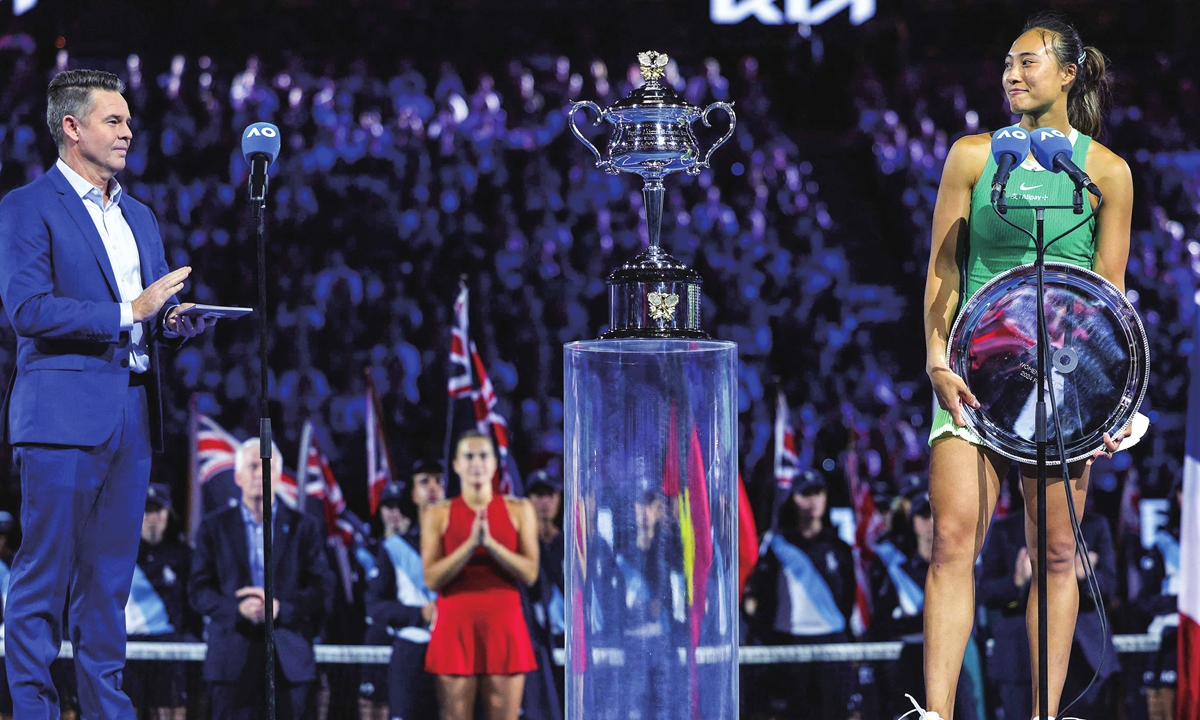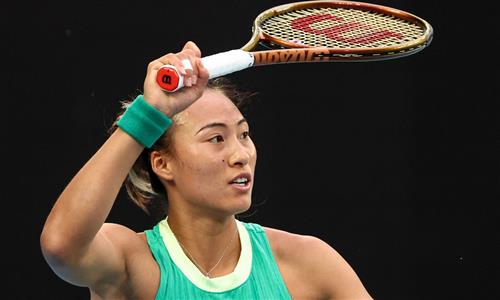SPORT / TENNIS
Tennis player Zheng Qinwen's quick trajectory to world top 10

Zheng Qinwen Photo: VCG
Nobody had predicted that a ninth Grand Slam entry would grant 21-year-old Zheng Qinwen an Australian Open final appearance.
Though being defeated to former world No.1 Aryna Sabalenka of Belarus with a 6-3, 6-2 defeat, there is still room for improvement for Zheng, who did not face a single seeded player on her run to the final.
"I have to work more on my tennis, also work more on my mental side," Zheng said after the final. "I have to try to figure out why and then come back stronger and better next time."
The Australian Open winner Sabalenka credited Zheng's capabilities.
"It is tough to lose in a final but you are such an incredible player," Sabalenka said to Zheng at the awarding ceremony. "You are going to be in many more finals and you are going to get it."
But Zheng, who turned pro in 2022 and had never previously been past the quarterfinals of a Grand Slam, has since won nationwide applause after she stepped onto the court of Rod Laver Arena at Melbourne Park.
Zheng was born in 2002 in Shiyan, Central China's Hubei Province. But her journey to tennis stardom wasn't a predestined path, it was a journey fueled by passion and an unyielding desire to conquer new heights.
Before tennis claimed her heart, Zheng spent two years playing table tennis. However, the allure of the expansive tennis court and the myriad possibilities it offered compelled her to switch sports.
An intriguing anecdote from her early years paints a vivid picture of her prodigious talent. At the age of 12, Zheng participated in a national competition, unleashing a serve clocking at an astonishing 170 kilometers per hour.
Stepping into the shoes of Li Na?
Following in the footsteps of China's tennis trailblazer Li Na, a two-time Grand Slam champion and a Hubei fellow, Zheng has become yet another Chinese female player to break into the top 10 and reach a Grand Slam singles final.
A decade-old photo featuring her joining a group of girls in Wuhan, Central China's Hubei Province, celebrating Li's victory after her winning the 2014 Australian Open was widely circulated on social media.
Many fans and analysts have then pinned their hopes on Zheng to become the new Li Na.
"Following the Australian Open, her world ranking has risen to 7th, making her the highest-ranked Chinese singles player since Li. Given her current upward trajectory, Zheng's prospects hold limitless possibilities," Beijing-based tennis commentator Chen Chi told the Global Times.
Chen noted that when Li made her first Grand Slam final at the Australian Open in 2011 where she was defeated by Kim Clijsters of Belgium, she was already 29.
"As Zheng is now only 21 years old, she has a lot of potential to explore," Chen said, before adding it takes defeats to become successful in tennis. "You always need defeats to gain experience to handle different situations."
Even Li's success has been derived from defeats. Her first Grand Slam win came at the French Open in 2011 after the Australian Open final defeat. It also took her three attempts before her eventual victory at the Australian Open in 2014.
Zheng, who was awarded the Most Improved Player by the Women's Tennis Association last season after winning 2022's Newcomer of the Year accolade, has also said it is Li's victory at the Grand Slams made her believe that a major title is reachable for a Chinese player.
Through countless of hard training schemes which even Zheng's coach Pere Riba "complained" about her unwavering determination, Zheng has carved her niche in tennis.
One notable example is that amid the COVID-19 pandemic, Zheng chose to train in Spain while many other players returned to their home countries. Under such critical conditions, she and her team had to train at unconventional times such as the hours before daybreak, which ultimately paved the way for her rise.
"Zheng's natural tennis prowess was undeniable. But what truly set her apart was the relentless effort she poured into honing her skills," Chen said.
Now her towering 1.78-meter frame hinted at the potential for a formidable tennis player. Dubbed the "Queen" by Western media for her given name Qinwen, Zheng's aggressive playing style and formidable serve have become her trademarks.
Huge market potential
In recent years, there has been a demand in the Chinese sports industry for such superstars after predecessors like hurdler Liu Xiang, basketballer Yao Ming and Li all have retired from competition.
As Tennis is one of the most financially lucrative sport disciplines, with tennis players consistently dominating annual earning lists, many have targeted Zheng as the next superstar.
After her runner-up finish at the Australian Open, Zheng has secured a lucrative prize money of Aus$1.725 million ($1.12 million). But her market value is expected to be much higher, analysts believe.
"Zheng possesses the characteristics of an international athlete, such as her on and off the court English proficiency," Zhang Qing, CEO of Beijing-based Key-Solution Sports Consulting firm, told the Global Times.
But Zhang underscores that though the business decorations could help Zheng become more popular, it is her athletic achievements that remain the core indicator of her marketing value.
"Beyond the glitz of business decorating, this rising star still needs to focus on her on-court performance if she wants to consistently gain favor in the world," Zhang said.
As three other Grand Slams are awaiting plus the tennis competition at the Olympic Games, Zheng still has a lot of opportunities to prove that she could go further.

